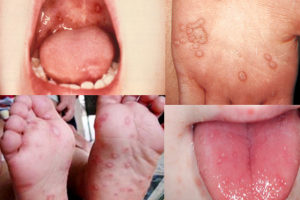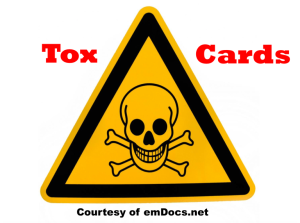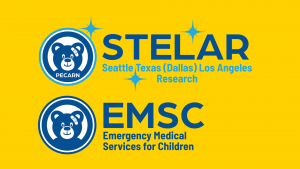Author: Sean Kolowich (Emory University School of Medicine) // Edited by: Cynthia Santos, MD (Senior Medical Toxicology Fellow, Emory University School of Medicine), Alex Koyfman, MD (@EMHighAK, EM Attending Physician, UTSW / Parkland Memorial Hospital) and Brit Long, MD (@long_brit)
Case presentation:
A 53 year-old previously healthy female is brought into the ED by family members 4 hours after ingesting 100 tablets of aspirin (325mg, unknown formulation). She has no complaints and denies any co-ingestions. VS: Temp 98.1 (oral), HR 93, BP 136/87, RR 20, pulse ox 98% on room air. CMP and ECG are unremarkable, ASA 47.1 mg/dL, ABG pH 7.48, pCO2 20, pO2 122.
Question:
What treatments should a salicylate poisoned patient receive?
Pearl/Pitfall:
Patients with salicylate poisoning should receive IV bicarb to alkalinize the urine. Indications for hemodialysis include cerebral edema, pulmonary edema, renal failure, intractable acidosis, clinical deterioration, or ASA level > 100 mg/dL or > 70 mg/dL if chronic.
- Support ABCs, prevent further organ toxicity by encouraging salicylate elimination
- Alkalinize the serum/urine
- 1-2 mEq/kg sodium bicarb. IV bolus followed by sodium bicarb. infusion (3 amps into 1L D5W) @ 1.5-2 X maintenance rate
- goal serum pH ~7.5
- goal urine pH >7.5
- 1-2 mEq/kg sodium bicarb. IV bolus followed by sodium bicarb. infusion (3 amps into 1L D5W) @ 1.5-2 X maintenance rate
- Alkalinize the serum/urine
- Salicylate overdose + IV sodium bicarbonate therapy = potential hypokalemia
- Avoid hypokalemia because it prevents alkalization of the urine ® prolonged elimination of salicylate
- goal K+ 4.0 to 4.5 mEq/L
- Monitor calcium levels (ionized/total); IV NaHCO3– can cause hypocalcemia
- Avoid hypokalemia because it prevents alkalization of the urine ® prolonged elimination of salicylate
- Consider glucose supplementation if altered mental status
- Serum glucose may be normal but CNS levels may be low 2/2 effects of salicylates
- Indications for extracorporeal treatment (intermittent hemodialysis is ECTR of choice):
- Salicylate level > 100 mg/dL (> 90 mg/dL if impaired kidney function) or > 70 md/dL if chronic.
- Cerebral edema (altered mental status, seizures)
- Renal failure
- Pulmonary edema or new hypoxemia requiring supplemental O2
- IF standard therapy fails AND:
- Salicylate level > 90 mg/dL (> 80 mg/dL if impaired kidney function)
- Systemic pH < 7.20
- Continue IV sodium bicarb therapy b/w ECTR sessions
Main Point:
Patients presenting with acute salicylate toxicity should receive supportive care and alkalinization with IV sodium bicarbonate. Hemodialysis should be considered early in treatment and is indicated if there is evidence of end organ damage (AMS, ARDS), failure of standard therapy, or severely elevated salicylate levels.
References:
- Lugassy DM. Salicylates. In: Hoffman RS, Howland M, Lewin NA, Nelson LS, Goldfrank LR. Eds. Goldfrank’s Toxicologic Emergencies, 10e. New York, NY: McGraw-Hill; 2015.
- Levitan R, Lovecchio F. Salicylates. In: Tintinalli JE, Stapczynski J, Ma O, Yealy DM, Meckler GD, Cline DM. eds. Tintinalli’s Emergency Medicine: A Comprehensive Study Guide, 8e. New York, NY: McGraw-Hill; 2016.
- Juurlink DN, Gosselin S, Kielstein JT, et al. Extracorporeal Treatment for Salicylate Poisoning: Systematic Review and Recommendations From the EXTRIP Workgroup. Ann Emerg Med 2015; 66:165










1 thought on “Tox Cards: Treatment for Salicylate Poisoning”
Pingback: Salicylate Poisoning | Emergency Medicine Cases | Best Case Ever